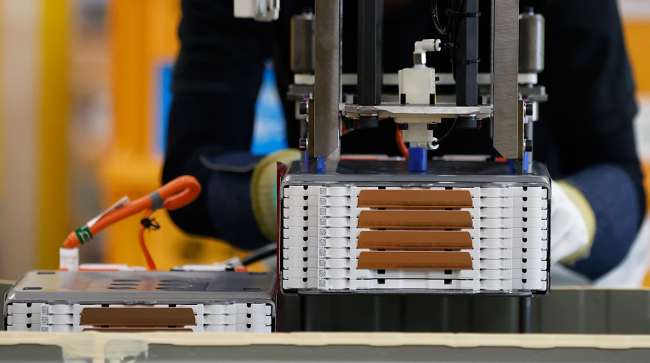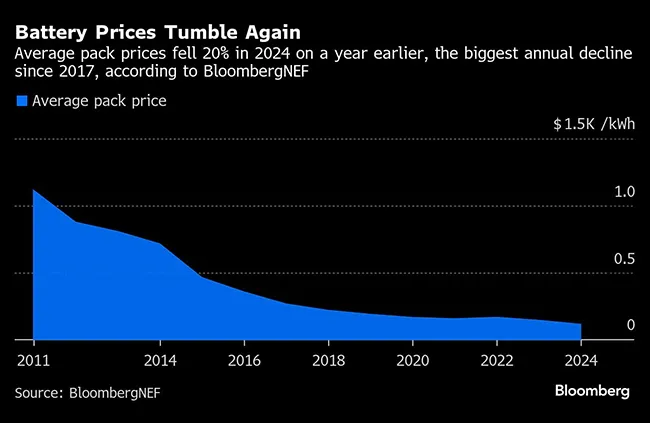Bloomberg News
Price of EV Battery Packs Falls Most Since 2017

[Stay on top of transportation news: Get TTNews in your inbox.]
The average price of lithium-ion battery packs has fallen the most in seven years, according to a BloombergNEF survey, in a development likely to accelerate price parity between electric vehicles and gasoline-powered cars.
The cost of battery packs has dropped 20% to $115 per kilowatt-hour in 2024, according to BNEF’s annual battery price survey. An overcapacity in cell production, lower metal and component prices and the continued shift to using cheaper lithium iron phosphate batteries drove the decline, the survey said. The study analyzed 343 data points from a range of applications including electric cars, buses and commercial vehicles.
The faster-than-expected decline signals that prices for electric vehicles could fall to similar levels to internal combustion engine vehicles as soon as in 2026, when average pricing is expected to fall below $100/kWh, the benchmark often referenced as the point of price parity. This has already been achieved in the Chinese market where average battery EV prices are below their gasoline-powered counterparts, according to the report.
“China alone is expected to produce enough battery cells to meet 92% of total global demand of 1.2 terawatt-hours for EV and stationary storage segments in 2024,” the report said. “This exerted downward pressure on battery prices. Smaller manufacturers are being challenged by their larger peers, pressured to lower cell prices and cut margins for market share.”

But oversupply of EV batteries isn’t likely to become the norm. EV cells are more dependent on car sales volumes, which ties production and shipment to the number of vehicles delivered. Battery manufacturers are less likely to produce excess EV cells as global demand is slowing, BNEF said.
Using pricing and volume data collected since 2010, BNEF forecasts battery pack prices will fall below $100/kWh in 2026 and reach $69/kWh in 2030. But geopolitics and changes in policy are adding uncertainties to the future outlook of EV adoption and, in turn, battery pricing.
In Europe, governments including France and Germany slashed subsidies for EVs earlier than expected. The resulting slowdown has seen lobbying to relax both the near-term vehicle CO2 targets and the longer-term plan to phase out internal combustion engine vehicle sales. Meanwhile President-elect Donald Trump has threatened to impose 60% tariffs on imports from China and 10%-20% tariffs on those from elsewhere.
“Navigating changing tariff regimes will remain a key challenge for battery suppliers and customers,” the report said.
Want more news? Listen to today's daily briefing below or go here for more info:




